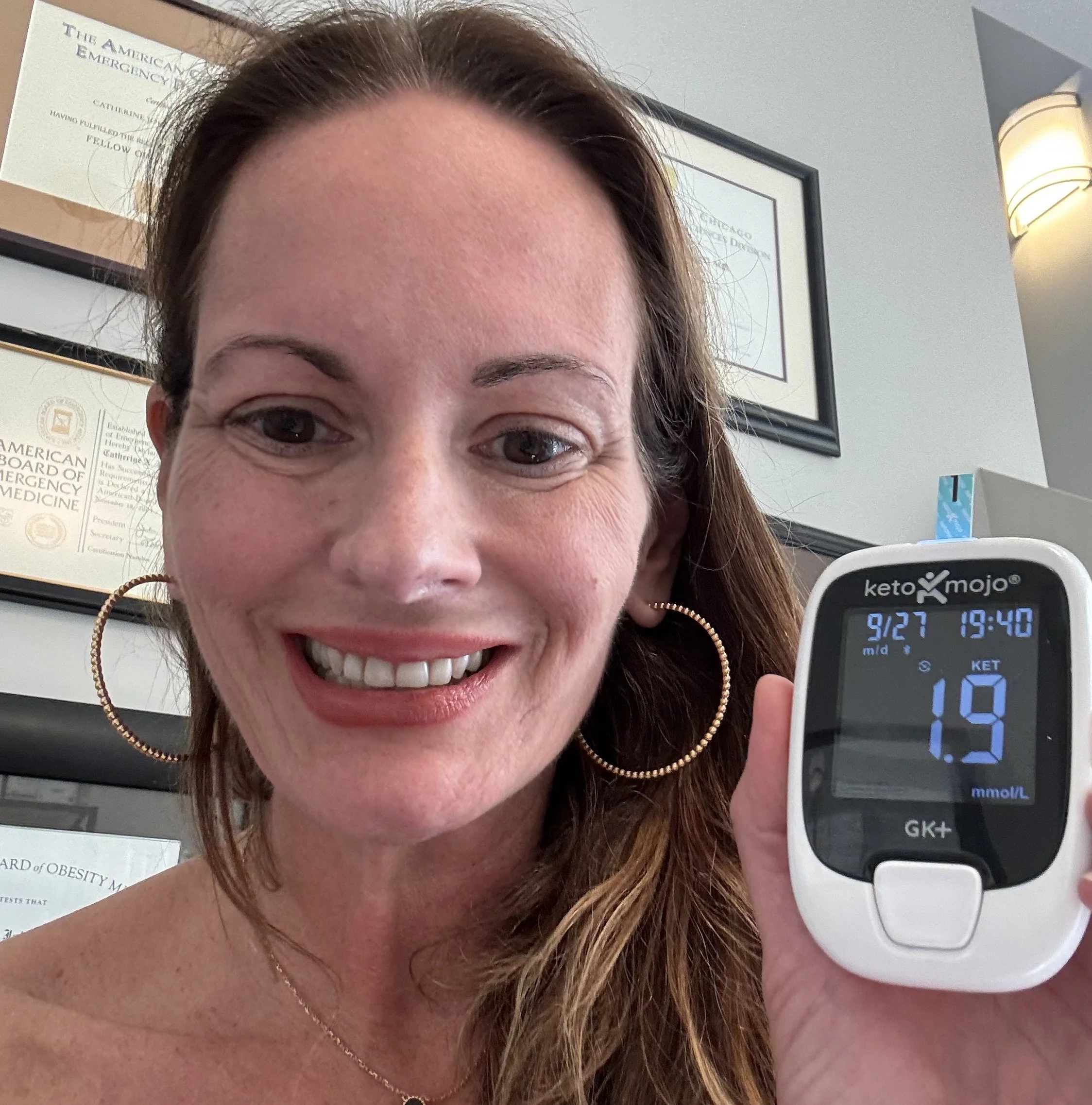Precision Medical Care Newsletter- August 2025
Our seven year anniversary is coming up! It was Labor Day weekend 2018 that Precision Medical care started seeing patients at the Clarendon Hills office. To scratch that “seven year itch,” we updated the practice website which went “live” on August 14th, have a look and let us know if you’d like to offer precision feedback- we are grateful for your support and suggestions to improve the website. We will be actively uploading newsletters to the articles page of the website, within the “Resources” tab. The “references” page includes access to a dynamic and ever-growing research database via “Precision Dropbox.” We welcome your submissions of relevant articles and references to this database, too.
the Clarendon Hills office (so tidy and uncluttered!) in Sep 2018
Dr. Vonda Wright’s advocacy for the precision prevention of osteoporosis and genitourinary complications of aging are highlighted here when she and our other expert physician colleagues (notably, Dr. Heather Hirsch and Dr. Kelly Casperson- keep reading to see our upcoming speaking events with these powerfully impactful women) appealed to the FDA to eliminate the black box warning label of vaginal estrogen, watch this.
We await the FDA’s actions to support the health of women who are seeking accurate and reliable information related to hormone therapy.
Dr. Agarwal and Dr. Johnson will be sharing the stage with Dr. Vonda Wright and Dr. Heather Hirsch on World Menopause Day (October 18th) at the HerLongevity in NYC. Join us if you’re able.
Dr. Johnson and Dr. Agarwal enjoyed an empowering event in Chicago on August 5th hosted by our friends Pamela DeRose and Julie Fedeli who wrote the book “Midlife Upgrade.”
Dr. Sameena Rahman spoke at the event and we learned so much about sexual medicine and pelvic floor health as did the Precision Medical patients who joined us for this hot night in the city!
Doctors Johnson and Agarwal with precision midlife upgraders Amy Khare and Tracy Korbus
MENOPALOOZA is coming to Chicago on Sunday, September 28th and Doctors Johnson, Agarwal and Sadiq will be speaking on stage. Come and join us for a lively afternoon with our friends Julie and Pam, authors of the great book: Midlife Upgrade.
Precision Updates from the Chicago Obesity Summit on July 25, 2025
Dr. Catherine with Dr. Puja Sethi at the Chicago Obesity Summit 2025. Dr. Sethi is Chicago area sleep expert and a precision partner to the practice.
Summaries from Dr. Johnson’s notes: We've learned much about gut hormones in the past 15-20 years, especially GLP1s, which have been life-saving in obesity and diabetes. Improvements in hormone regulation include GLP1s and new therapies such as DACRAs (dual amylin-calcitonin receptor agonists) will target complex receptors in the brain, prolonging activation to decrease food intake and improve insulin sensitivity. These emerging therapies are aiming to mitigate any bone and lean muscle mass losses.
Recent advancements in obesity and type 2 diabetes management have focused on hormone-based therapies, particularly GLP-1 receptor agonists (Semaglutide: Ozempic/Wegovy), GIP receptor antagonists (Tirzepatide: Mounjaro/Zepbound), and combination therapies. These new medications show promising results in clinical trials, demonstrating significant weight loss and improvements in glycemic control. Notable agents include MARIDEBART (GIP receptor antagonist), SURVODUTIDE (GLP-1/glucagon combination), RETATRUTIDE (GLP-1/GIP/glucagon combination), and CAGRILINITIDE (amylin analog). Phase 2 and 3 trial data show weight loss ranging from 12-22% and A1C reductions of up to 2%. These therapies also show potential benefits for liver function, visceral adiposity, and steatohepatitis (fatty liver/liver inflammation). However, side effects such as nausea, vomiting, and injection site reactions are common, and long-term safety data is still being collected.
Preservation of muscle mass during weight loss is crucial for maintaining physical function and metabolic health. New therapies targeting muscle growth and preservation are being developed, such as BIMAGRUMAB (anti-myostatin antibody). Phase 2 trial data shows that Bimagrumab, alone or in combination with semaglutide, can increase lean body mass or mitigate its loss during weight loss.
High cholesterol levels are a concern, hyperlipidemia is characterized by delayed clearance of chylomicrons leading to high triglycerides. The exogenous and endogenous pathways of lipid metabolism contribute to the formation of cholesterol-rich particles that are cleared by the liver. Understanding these pathways is crucial for targeting therapy. Recent advancements in drug therapy include antisense oligonucleotides and small interfering RNA, which reduce protein production by targeting messenger RNA. These new approaches, along with traditional therapies, aim to reduce LDL cholesterol and cardiovascular risk in obese patients.
Repatha is a PCSK9 inhibitor, meaning it blocks a protein called PCSK9 that can increase LDL cholesterol levels. By inhibiting PCSK9, Repatha helps the liver remove more LDL cholesterol from the blood, thus lowering LDL levels. This reduction in LDL cholesterol can help prevent or slow the progression of atherosclerosis and reduce the risk of heart attack, stroke, and other cardiovascular events.
Inclisiran (Leqvio) is a new, FDA-approved small interfering RNA targeting PCSK9 messenger RNA, for LDL reduction (52% reduction). This medication is given as an injection every 6 months and it is free for Medicare patients who qualify for therapy.
Another new lipid lowering therapy is Bempedoic acid, blocks the same pathway as statins but higher up, at ATP citrate lyase. It's a prodrug activated only in the liver, not in muscle, reducing muscle side effects. It lowers LDL by about 17%, similar to ezetimibe (Zetia), with minimal muscle complaints. Adding bempedoic acid or ezetimibe is equal to three doublings of a statin dose without side effects. Combination therapy is becoming more common to minimize side effects and increase potency.
Lipid specialists recommend genetic testing to identify hereditary cases of elevated cholesterol levels which can increase one’s risk of heart disease. familial hypercholesterolemia. Heterozygous familial hypercholesterolemia involves a mutation in the LDL receptor gene, leading to double the normal LDL cholesterol, usually 190 or above. It's an autosomal dominant trait, so one parent has it, and there's a 50-50 chance of passing it to children. Homozygous Familial hypercholesterolemia is an autosomal dominant trait, and children should be tested early. These patients are often physically active but have a high risk of heart attack. Homozygous familial hypercholesterolemia patients have LDLs over 500 and may require liver transplants or LDL apheresis (plasma exchange). There is a new drug, evinacumab, an antibody against ANGPTL3 which lowers LDL by 50% in homozygous familial hypercholesterolemia patients. It also inhibits lipoprotein lipase, lowering triglycerides. Evinacumab is expensive and approved only for homozygous FH. Lipoprotein(a) is a lipid particle associated with increased cardiovascular risk. High Lp(a) levels are common in up to 20% of the population and have a significant risk curve for risk of heart disease and stroke. Statins do not lower Lp(a),but new medications like Pelacarsen and Muvalaplin, which lower Lp(a) significantly, are in development. Outcome trials for these drugs will be published soon.
Cholesterol Esterase Transferase Protein (CETP) inhibitors such as Obicetrapib have potential to not only lower LDL by 30-40% but may also raise HDL cholesterol levels. There is increasing data to show that this class of medication may reduce amyloid deposition in ApoE4-E4 dementia. https://ir.newamsterdampharma.com/news-releases/news-release-details/newamsterdam-pharma-announces-positive-topline-alzheimers
These advances in precision therapeutics are exciting but the immediate future of actionable treatments will include oral GLP-1 therapies for weight loss. So for those who are hesitant to take a weekly or quarterly injection, there will soon be a daily Ozempic -type pill. These meds will be on the market before DACRA therapies but you know how much we love precision medical forecasting!
New 2025 joint guideline from the American Heart Association and the American College of Cardiology: Blood Pressure
These updated blood pressure guidelines are an excellent resource, read the recommendations and take note that these guidelines include strong language related to the importance of reducing alcohol consumption to lower blood pressure and reduce cardiovascular disease, risk of stroke and dementia. “Ideally, consuming no alcohol or for those who choose to drink, no more than two drinks per day for men and no more than two drinks per day for women.”
Supplement Spotlight: Exogenous Ketones
Exogenous ketones can help to boosting energy, sharpen focus, and support overall wellness.
What Are Ketones, Anyway?
Your body naturally produces ketones when it breaks down fat for fuel, like during fasting, exercise, eating fewer calories “fasting mimicking,” or a low-carb (keto) diet. These ketones act as source of energy for your brain and muscles, providing steady energy without the ups and downs of sugar or caffeine. Think of ketones as your body’s backup power source when carbs aren’t around.
There are two types:
Endogenous ketones: Made inside your body through diet or lifestyle changes.
Exogenous ketones: These come from outside sources, like supplements. They quickly raise your ketone levels in the blood, mimicking that fueled-up feeling without needing to follow a strict keto diet.
Exogenous ketones come in forms like drinks, powders, or salts and they make great “fasting fluids.”
How Do Exogenous Ketones Work?
When you take exogenous ketones, they enter your bloodstream and get converted into energy. This can help your body shift into a state called “ketosis,” where it burns fat more efficiently. Studies show this process can lower blood sugar levels and provide a clean energy boost. For instance, research indicates that exogenous ketones can decrease blood glucose while increasing ketone levels in the body. Unlike coffee or energy drinks, exogenous ketones don’t cause you to have side effects like jitters or crashes.
Key Benefits: What Can They Do for You?
Exogenous ketones aren’t a magic pill, but early research and user experiences suggest several perks, especially for energy and brain health. Here’s a breakdown in simple terms:
Boosted Energy and Stamina: They provide a steady fuel source for your brain and body, which may help during workouts or long days. Some studies link them to better athletic performance and faster recovery by reducing inflammation and supporting muscle repair.
Sharper Focus and Mental Clarity: Ketones are great brain food! They can enhance cognitive function, like memory and decision-making, and may even help with conditions like brain fog. One review notes improvements in cognition and motor skills in neurological scenarios. Plus, they might stabilize mood by supporting neuron growth.
Appetite Control and Weight Support: They can act as natural appetite suppressants, helping you feel fuller longer. A small study found they lowered hunger hormones in participants. This could aid weight management when combined with healthy eating.
Blood Sugar Balance: For those watching their glucose, exogenous ketones may help lower levels without causing spikes. 6 They’re also being explored for heart health benefits, like improving oxygen flow.
Other potential upsides include reduced inflammation and support for long-term metabolic health, but more research is needed to confirm these for everyone.
Spotlight on Kenetik: A Tasty Way to Try Exogenous Ketones
If you’re curious about trying exogenous ketones, Kenetik is a user-friendly option. It’s a ready-to-drink beverage (or concentrate you can mix) powered by a patented blend of pure D-beta-hydroxybutyric acid (D-BHB) and R-1,3 butanediol—bioidentical ketones that mimic your body’s natural ones. Each (direct to consumer) serving delivers about 12 grams of ketones, flavored with natural fruit extracts for a refreshing taste without bitterness. https://drinkkenetik.com/products/kenetik-ketones-drink?srsltid=AfmBOor7vaQGfSJAFqOHexK89aZXRlG7UeIHHWl8CWWPETkN53X00USa
At the office (and available via home delivery/dropshipping), we can now offer professional grade exogenous ketones. https://kenetikpro.com
As you might know, Dr. Agarwal and Dr. Johnson like to measure ketone levels at the office on themselves and on our precision medical patients with the Keto Mojo finger stick device. We have been testing our ketone levels with these supplements and they really work! They are pricey at $140 (office price) for about 15 servings, so we are hopeful that we can work with the manufacturer to offer precision pricing.
Testing out ketone levels after one serving of KenetikPro, fasted for about 14 hours… impressive results!
News Update:
Ozempic is now available for cash price of $499 monthly. It is great to see the cash pricing of these meds become more competitive but we really need even lower pricing to help the millions of Americans who would benefit from treatment but cannot afford these prices.
Recommended Podcast and Articles:
Case studies of less frequent dosing GLP and weight loss maintenance:
https://onlinelibrary.wiley.com/doi/10.1002/oby.24302
Perimenopause explained by two top hormone experts
https://podcasts.apple.com/us/podcast/as-a-woman/id1449553339?i=1000719618621
Inflammation: Mast Cell activation
https://podcasts.apple.com/us/podcast/the-dr-gabrielle-lyon-show/id1622316426?i=1000719627798
Great overview on women’s cardiac risk
https://podcasts.apple.com/us/podcast/the-dr-gabrielle-lyon-show/id1622316426?i=1000718456892
Mast cells and Chemical intolerance
https://apple.news/nowPlaying/AAAIZgOb1R4m5pKaOmG9Tzw
Personal Improvement:
Dr. Johnson's Naples Dates
September 4th-September 6th
October 3rd-October 6th
November 1st-November 3rd
*More dates to come for 2025-2026*




